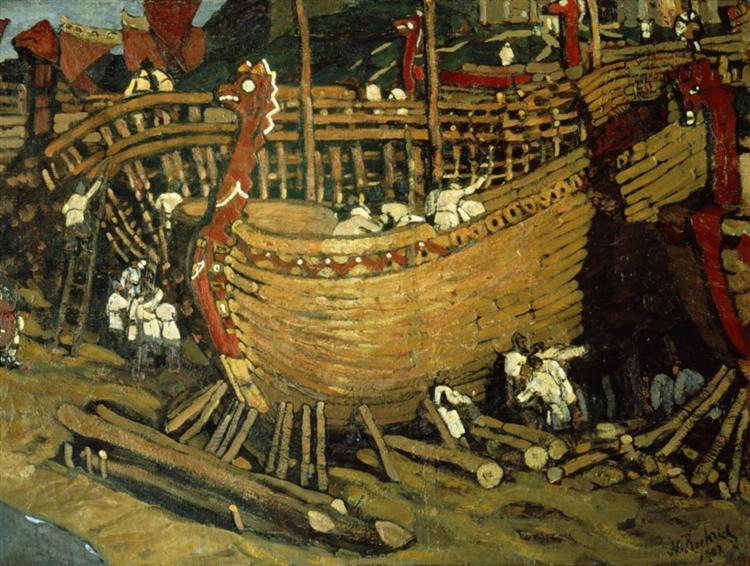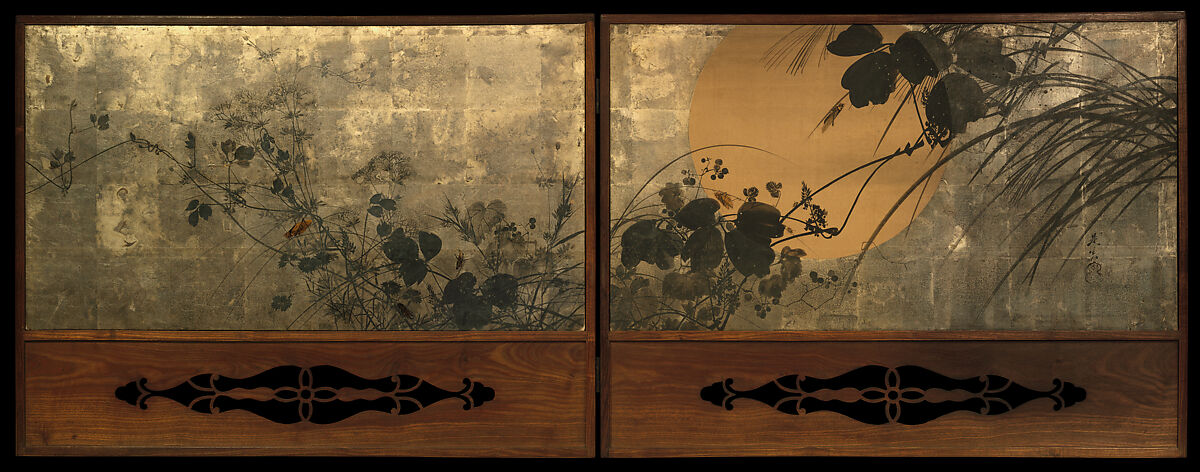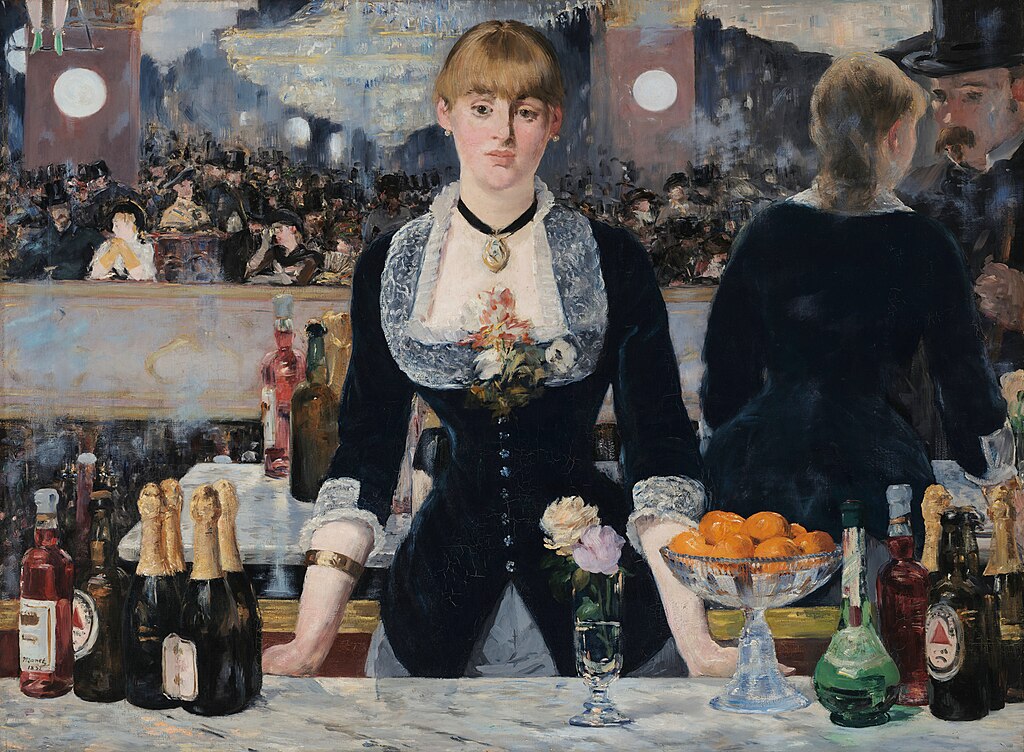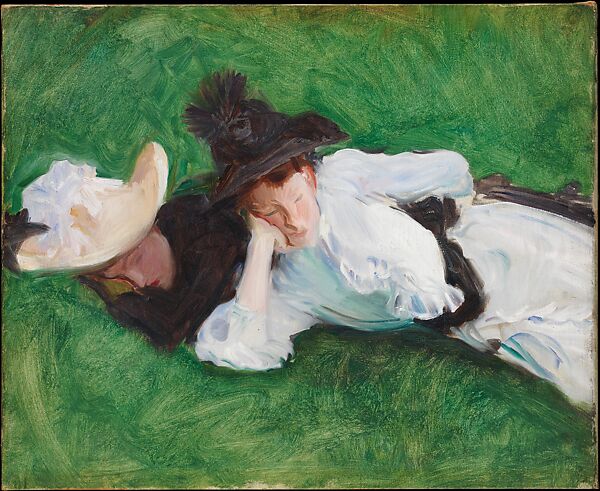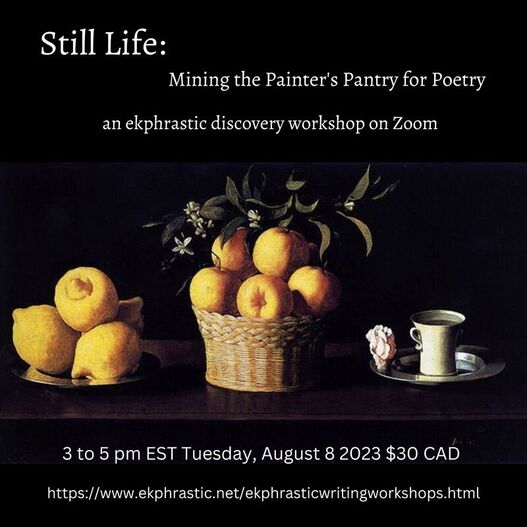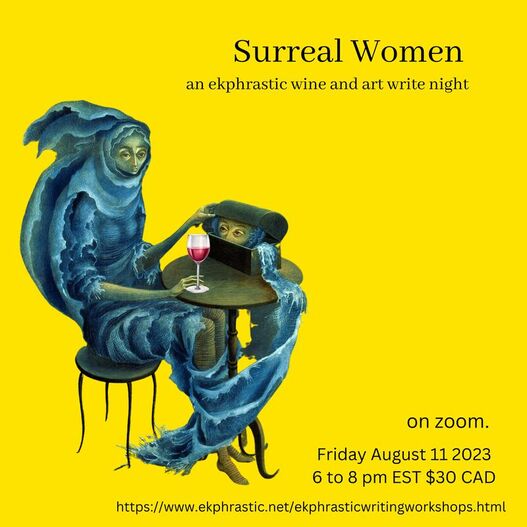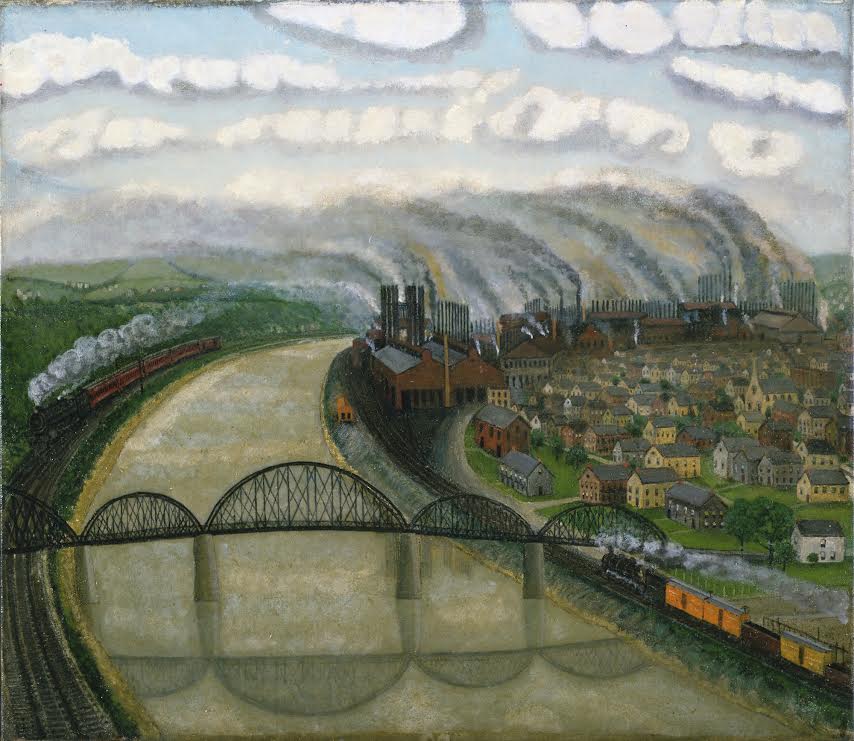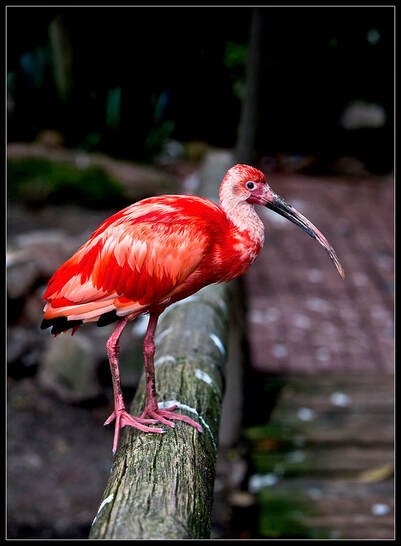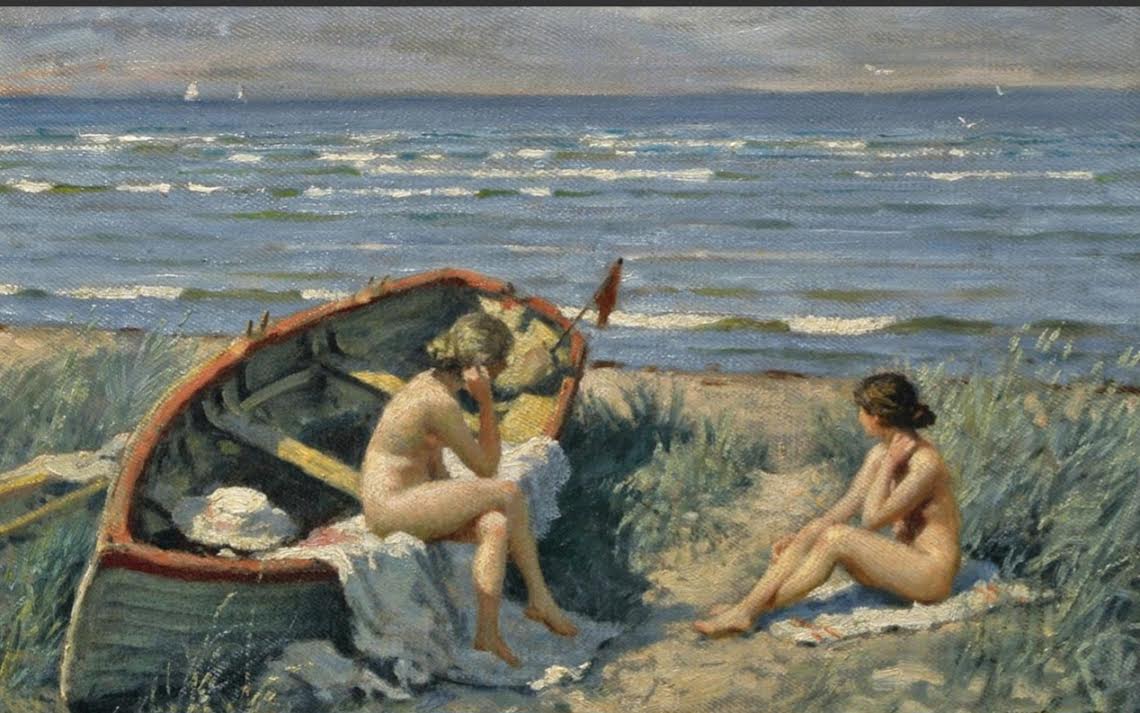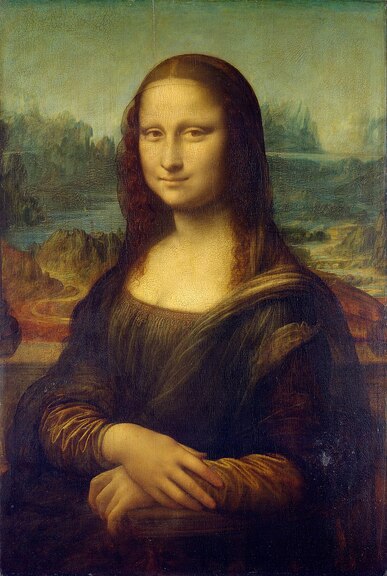|
Building the Ships I admire these men too much. When these men get off work They gather in barracks to drink and talk about everything except the ships they are building. And if one of them tries, another will say, “Evgeny! Do we have to talk about work?” They are competent to an erotic degree. They use hand tools that were made by other hand tools to build things that float down rivers, that carry men to wars, or goods to trade. Or fish? Are these fishing boats? I don’t know. The builders know, and the painter knows, and maybe what they know is true. I want this to be true. I want a world that gives us compositions like this. Where the planks of wood are rendered by layered tranches of effulgent browns and golds. Where there are seven ships with dragon prows, and two dozen men with white tunics, red hats, and suggested faces. Where the shapes cohere even if they are abstract, even if there is no content or meaning to glean. I would step into this image painted by a mystic wanderer romantic liar priest of corrupt emergent beauty. If the men got off work -- if the men ever get off work one of them would say, “Evgeny. The painting is over, let’s drink.” If the men get off work, the painter will not drink with them. He can only admire them from a distance because they only exist at the distance he paints them. Somewhere in the paint the builders have language and song and names. But that’s the only place. And I can’t see it. Gary Chapin Gary Chapin is an educator, advocate, poet, and accordionist living in central Maine (US) with his wife, Sunshine, and four cats. Ursula is his favorite of the cats. He's written one very amusing book about education, and is a writer and editor of MuddyUm, a humour publication on Medium.
0 Comments
Autumn Grasses in Moonlight These darkened leaves and grasses on a paper screen shadow a graceful gathering of cicadas with folded wings clinging fast to silver stems waiting to resume their songs waiting, silent and still until the moonlight passes over and the night spreads its cover just as I have been waiting all along, quiet and withdrawn for my moment of freedom * Sometimes the ink will bleed the rhythm of the water and everything washes together Sometimes the ink defines a structure and divides the seen from unseen I hoped my script would sing like the cicada I hoped my cursive would shine like silver I hoped to earn the graces of this paper I hoped to keep a language for my dreams John Tessitore John Tessitore has been a journalist and biographer. He has taught history and literature at colleges around Boston and directed national policy studies on education and civil justice. He serves as Co-Editor Across the Pond for The Wee Sparrow Poetry Press. His poems have appeared in a variety of journals and he has published five chapbooks and a novella available at johntessitore.com. The Lonely Bartender The atmosphere in the bar bubbles and fizzes like the champagne that flows from bottles to glasses. People are everywhere; drinking, talking, laughing. They constantly mingle and share small talk and yet no one bats an eye at those working the bar. However, I do. I lost my friends in the shuffle, so I go up to ask for a drink. The first woman who sees me approach asks: what’ll it be? with a tired look in her eyes. I say I don’t know for sure and ask what she likes best. She’s confused at this answer, looking down at the flowers pinned to her bosom as if they knew the answer. No one had asked her that before, I think. A Manhattan should suffice, she says, as her hands swiftly assemble the simple drink. I reach into my pocket to give her a tip, and her hazel eyes watch but she signals for me to stop. It’s on the house, she whispers as a blush enters her pristine face. I nod in thanks, holding the drink delicately, and I turn back to the mingling crowd hoping this woman working the bar gets noticed again. Amanda Gattshall Amanda Gattshall is a senior at Flagler College studying Coastal Environmental Science and Creative Writing. When she is not conducting research out on the water or jamming out to video game soundtracks while writing stories, she also loves playing D&D with her friends or curling up with a good book and a warm cup of tea. She was recently a featured speaker at her college's Baccalaureate Ceremony, and she is spending her last semester as an editor for FLARE: The Flagler Review. To read more of her work, more of her poetry will be in the upcoming Spring Issue of Outrageous Fortune. In the Grass Two girls on a lawn so soft the one in black sleeps her head cradled in her bent arm the other in a ruffled white dress props herself up on her elbow rests her head on her hand As a girl I’d lie in the grass to study the clouds Or swinging bend back over the seat to turn the world upside down inhaling the sharp scent of freshly mown grass stained hands and knees Years ago I told my brother as we drove through hills of tall grasses that I always dreamed of running barefoot through the grass toward someone and he replied on the verge of divorce cockleburs hurt Two girls on a lawn napping a study of white and green and black not of grass and its stickers how even through fabric it scratches LeeAnn Pickrell This poem was first published in Eclectica. LeeAnn Pickrell is a poet, freelance editor, and managing editor of Jung Journal: Culture & Psyche. Her work has appeared in a variety of online and print journals, most recently in Loud Coffee Press, Atlanta Review, and MacQueen’s Quinterly. She has a book forthcoming from Unsolicited Press. She lives in Richmond, California, with her partner and two fabulous cats. Two amazing workshops coming up. Join us! Still Life: Mining the Painter's Pantry is an ekphrastic discovery workshop on Zoom. The centuries old painting genre of still life is an audience and collector favourite. What is it about a bowl of fruit or an old vase that we find so compelling? For writers, the humble pantry paintings are actually a goldmine of inspiration when we look more carefully. Still life paintings were historically chock full of symbols of both status and spirituality. In this workshop, we will learn a little bit about the history of still life paintings, dive into their historic symbols, view classic and contemporary creations alike, and stretch our imaginations with some creative exercises to generate ideas and poems or stories. We will also look at a few poems born from still life artworks. Tuesday August 8 2023 from 3 to 5 pm eastern time. ** Surreal Women: Join us on Zoom on Friday August 11 to relax in the company of other writers. We will be looking at a variety of artworks by women surrealist painters and using them to inspire our stories and poetry. This is a casual, interactive, generative workshop, with a bit of background history but focused on creative exercises and community. You can bring your favourite beverage to sip whether it is Shiraz or orange pekoe. Surreal Women: an ekphrastic wine and art write night
CA$30.00
Join us on Zoom on Friday August 11 to relax in the company of other writers. We will be looking at a variety of artworks by women surrealist painters and using them to inspire our stories and poetry. This is a casual, interactive, generative workshop, with a bit of background history but focused on creative exercises and community. You can bring your favourite beverage to sip whether it is Shiraz or orange pekoe. Still Life: Mining the Painter's Pantry for Poetry
CA$30.00
Still Life: Mining the Painter's Pantry is an ekphrastic discover workshop on Zoom. The centuries old painting genre of still life is an audience and collector favourite. What is it about a bowl of fruit or an old vase that we find so compelling? For writers, the humble pantry paintings are actually a goldmine of inspiration when we look more carefully. Still life paintings were historically chock full of symbols of both status and spirituality. In this workshop, we will learn a little bit about the history of still life paintings, dive into their historic symbols, view classic and contemporary creations alike, and stretch our imaginations with some creative exercises to generate ideas and poems or stories. We will also look at a few poems born from still life artworks. Tuesday August 8 2023 from 3 to 5 pm eastern time. Homestead Bird’s-eye, as in mid-flight, midair And slightly upriver, The bridge in the foreground And its watered-down reflection Parallel to the picture plane. The sky fluffed up with clouds. Not quite Giotto’s God’s-eye view In which the world gets seen From all sides. Homestead Is crowded rows of houses, Steel mills billowing Identical plumes of smoke, Bent level toward the horizon-- One of his vernacular, Detail-driven landscapes, Description like composition A way to lead the eye around it, Taking in the features Of the “industrial sublime.” Scumble and glaze came later. Here the world is local colour, The way he first applied it, Painting scenes on the sides Of boxcars during lunchbreaks At work. A job he’d likely Thought of while brushing in The slow freights he’s strung Along either side of the river. He’s got its slurry just right, And the massive scale Of the open hearths, pikestaffs Of the blast furnace chimneys. 1929. The economy About to tank as if in another country. Robert Gibb Robert Gibb is the author of Sightlines (Poetry Press, 2021), his thirteenth full-length poetry collection, winner of the 2019 Prize Americana for Poetry. Other books include Among Ruins, which won Notre Dame’s Sandeen Prize in Poetry for 2017, After, which won the Marsh Hawk Press Poetry Prize for 2016, and The Origins of Evening (Norton, 1997), which was a National Poetry Series selection. He has been awarded two NEA Fellowships, a Best American Poetry, a Pushcart Prize and Prairie Schooner’s Glenna Luschei and Strousse Awards. A new book, Pittsburghese, has won 2023’s Wheelbarrow Books Poetry Prize and is forthcoming from Michigan State University Press. Scarlet Ibis Red birds turn dark as twilight falls, the day lost its colour, drifted into darkness. Beyond the town’s granite statues, birds fly homewards over the football stadium billboard, blazing neon above the field, where odd shoes lie like fish on a market day slab. Air filled with the smell of gunshot assaults my nose. In the south-west corner of the sky, Venus is rising to shine, beckoning wayfarers’ home to the night. I recall fields of gold, crops spread out across the land, flower posies in little girls’ hands, the smell of apples lying in the winter loft, safe. Morning will bring the feathers red again. Margaret Kiernan This prose poem was written in response to The Nursery of Ibis, by Daria Petrilli (Italy) contemporary. View it here. Margaret is an Irish author and writes prose and poetry. She is widely published in journals and magazines and on-line, in four continents. She is a 2023 nominee for The Best of The Net Award for a second year running. She is listed in the Contemporary Women Poets in Ireland, at University College Dublin. Her background is in Human and Social Rights advocacy. She is an activist. She writes policy papers on Inclusion and Diversity. Her hobby is painting, in watercolour and acrylics. Her work has been exhibited. Beach at Bastad, Paul Gustav Fischer, Denmark, 1902 The tide leaving slowly as the sun dries the beach, we found a small dingy, red and white, just where the tide meets. That’s our dingy, and this is our beach. Not really. But the encroaching moss and piles of drift wood tell me no one else knows, so it’s ours for now. Time is taking our dingy, ammophila surrounding our paradise, creating a puzzle in the sand. No matter, our paradise is here for now. She leans forward on her towel, knees curled to her chest, one arm massaging her neck , mesmerised by the storm far at sea. She is peace, she is silence. Mine for now. I’m not watching the storm, I sit perched on the edge of our dingy, I watch the wind dance through her hair, the sand swirling around her toes, I’ve never felt envy for the elements before. We stay for now, for as long as we can. Silence and paradise. Just two girls at the beach of Bastad. Rae Brooks Rae Brooks is an avid pet owner who recently completed a course in creative writing and was drawn to poetry in most of its forms. Mona Lisa (1503) Everybody’s always talking about your smile, but nobody ever mentions how good you look for your age. Clint Margrave Clint Margrave is the author of several books of fiction and poetry, including Lying Bastard, Salute the Wreckage, The Early Death of Men, and most recently, Visitor. His work has appeared in The Threepenny Review, Rattle, The Moth, Ambit, and Los Angeles Review of Books, among others. Installation Like a land down under? I said to my friend who lives in Australia, our faces drawn into two of several oval holes positioned to frame and multiply inside a black box, a metaphor expanding animals of current alternating in reflection, blue-red-green receding past astonished expressions. Yeah, Karl said, I feel at home, his phone out to record our double neon hydra. Later we’d look at the screen and wonder how he got the photo without dropping the device inside, smashing lights and choreographed mirrors, setting off alarms as shards fly into our eyes. Fuck, he’d have yelled, fuck, over the noise and chaos of panicked guards, and I’d have only a moment to focus one good eye on the darkness we knew was there. Helena Feder Helena Feder is the author of Ecocriticism and the Idea of Culture (2014/2016) and many articles, essays, interviews, and poems. She is the editor of several journal issues and two books: You Are the River (NCMA 2021) and Close Reading the Anthropocene (Routledge 2021). She is Associate Professor of Literature and Environment at ECU, and currently working on her first book of poems. |
The Ekphrastic Review
COOKIES/PRIVACY
This site uses cookies to deliver your best navigation experience this time and next. Continuing here means you consent to cookies. Thank you. Join us on Facebook:
Tickled Pink Contest
April 2024
|
